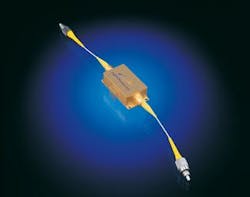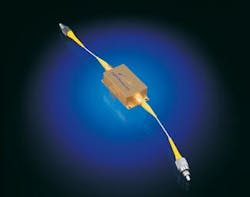NP Photonics' tunable filters pass Telcordia compliance tests
30 April 2003 Tucson, AZ Lightwave -- NP Photonics has announced that its tunable filters have passed a series of rigorous reliability tests that comply with Telcordia GR-1221 guidelines, which establish generic reliability assurance requirements for passive optical components.
The tunable filter modules succeeded in all of the accelerated lifetime tests, including high- and low-temperature storage, temperature cycling and shock, fiber pulling, moisture storage, impact shock, and vibration.
"Our tunable filter was designed to be Telcordia compliant and now we have the test results to prove it," asserts Linda West, product manager at NP Photonics. "We've run the tests, and the outstanding results we've received prove what our customers already know--that NP Photonics tunable filters not only lead the industry in performance, they lead in ruggedness and reliability as well."
NP Photonics tunable filters are Fabry-Perot devices that can tune across the entire C- and L-bands with resolution down to 1 pm and monitor channel separations as narrow as 25 GHz or less. The company incorporates its proprietary Compliant MEMS (CMEMS) filter design to accomplish precise filter alignment and control and uses a unique packaging method and mirror configuration to achieve immunity from environmental stresses such as temperature fluctuation and vibration.
The wavelength temperature dependence of NP Photonics' TFM Series filters is less than 5 pm/ ° C. These devices also feature a Finesse of up to 2000, contrast greater than 60 dB, and insertion loss less than 2.5 dB. In addition, the devices are hermetically sealed in a butterfly package to further guarantee consistent and predictable performance.
Applications for tunable filters include optical performance and channel monitoring in the metro and long-haul areas of all-optical telecommunications networks. Their compact size also makes them ideal for handheld optical performance monitors and test instruments. In addition, NP Photonics' uses their tunable filters as the core of optical spectrum analyzers and interrogation systems used with the latest range of Fiber Bragg Grating pressure, temperature, or strain sensors. The company has secured a number of design wins and has been shipping to an established customer base for several months.
